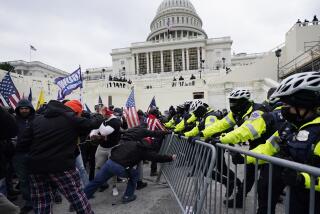Court Eases Double-Jeopardy Protection
- Share via
WASHINGTON — The Supreme Court ruled Wednesday that the Constitution’s ban on “double jeopardy” does not prevent the government from imposing a punishing fine and a sanction, in addition to a prison term, on a white-collar criminal.
The ruling strengthens the power of regulatory agencies in such areas as banking, stock trading, workplace safety and the environment. At the same time, it strips defendants of their claim that a second punishment for the same offense is unconstitutional.
In a 9-0 ruling, the high court said federal prosecutors can bring criminal bank fraud charges against three former Oklahoma bank directors, even though they earlier had paid large fines to the U.S. Treasury Department for having secretly loaned themselves money.
Wednesday’s decision is not limited to regulatory affairs, however. It also surely will block a constitutional challenge to “Megan’s laws.”
Since 1994, all 50 states have enacted laws that require paroled sex offenders to register their home address with the government so the community can be notified of their presence.
Two weeks ago, a group of New Jersey sex offenders appealed to the Supreme Court, asserting that this second punishment for their crimes violates the double-jeopardy guarantee.
In fact, a 1989 Supreme Court decision said essentially that. An extra fine or sanction that “qualifies as punishment in the plain meaning of the word” would violate the double-jeopardy guarantee if imposed after a prison term, the court said in U.S. vs. Halper.
However, writing an opinion for five of the justices, Chief Justice William H. Rehnquist essentially overruled the Halper decision Wednesday.
The double-jeopardy clause of the 5th Amendment says “no person [shall] be subject for the same offense to be twice put in jeopardy of life or limb.”
Rehnquist said this “does not prohibit the imposition of any additional sanction that could, in common parlance, be described as punishment. The clause protects only against the imposition of multiple criminal punishments for the same offense, and then only when such occurs in successive proceedings.”
This more narrow approach returns the law to where it stood before 1989. Many legal experts had forecast the move.
“I’m not surprised at all,” said George Washington University law professor Mary M. Cheh, noting the “substantial overlap between criminal enforcement and civil enforcement. It’s hard to undo all that, so it’s no surprise they have thrown up their hands and said we’re going back to where we were before.”
The issue arises most often in regulatory cases.
In a case of insider trading, for example, the Securities and Exchange Commission may quickly impose a fine and bar the violator from further trading. After an additional investigation, the SEC may then bring a criminal charge against the same person.
Similarly, agencies that enforce workplace safety laws, fund health care, police the sale of farm products or protect the environment have the power to hand down large fines against violators. They can also recommend subsequent criminal prosecution by the Justice Department.
The high court’s 1989 decision called all those double punishments into question.
“It caused a stir in the legal community and set lawyers scrambling,” said Cheh, who has written about the confusion over civil versus criminal enforcement.
Rehnquist noted the ruling had spawned “a wide variety of novel double-jeopardy claims.”
Federal housing officials, for example, have begun to evict drug criminals from public housing. But last year, a lawsuit heard in Philadelphia claimed that an eviction amounted to a second punishment for the same crime.
Drunk drivers who lost their licenses and then faced criminal charges raised the same claim.
Rehnquist concluded that focusing on whether a fine or sanction is a type of punishment “has proved unworkable.” From now on, he said, if a federal or state law says its fines or punishments are civil, they do not count for purposes of the double-jeopardy clause. His opinion in Hudson vs. U.S., 96-976, was joined by Justices Sandra Day O’Connor, Antonin Scalia, Anthony M. Kennedy and Clarence Thomas. The other justices, while agreeing the Oklahoma bank officials could be prosecuted, refused to go along with the chief justice’s narrow approach to the double-jeopardy clause.
In a partial dissent, Justice John Paul Stevens faulted Rehnquist for “using this case as a rather lame excuse for writing a gratuitous essay about punishment.”
More to Read
Sign up for Essential California
The most important California stories and recommendations in your inbox every morning.
You may occasionally receive promotional content from the Los Angeles Times.











